Relationship between School Administrators’ Superleadership and Teachers’ Job Satisfaction under the Supervision of Samut Prakan Primary Educational Service Area Office 2
Keywords:
Superleadership, Satisfaction, RelationshipAbstract
This research aimed to investigate school administrators’ superleadership, teachers’ job satisfaction, and their relationship. The samples were 300 teachers working at large-sized and medium-sized schools under the supervision of Samut Prakan Primary Educational Service Area Office 2, obtained through stratified random sampling. The instrument was a questionnaire. Data were analyzed using percentage, mean, standard deviation, and correlation coefficient.
The results revealed that:
1) School administrators’ superleadership was high. The highest mean was displayed by the encouragement of self-set goals, followed by the modeling of self-leadership, whereas the lowest mean was displayed by the development of positive thinking.
2) Teachers’ job satisfaction was high. The highest mean was displayed by career progression, followed by job descriptions, whereas the lowest mean was displayed by work environments.
3) The relationship between school administrators’ superleadership and teachers’ job satisfaction was very high. The highest positive correlation was displayed by the development of positive thinking, followed by the modeling of self-leadership, whereas the lowest positive correlation was displayed by the encouragement of self-leadership among personnel and the promotion of self-leadership through team building.
References
กฤติยา มามีชัย. 2562. การศึกษาภาวะผู้นำเหนือผู้นำของผู้บริหารสถานศึกษา สังกัดสำนักงานเขตพื้นที่การศึกษา ประถมศึกษาจันทบุรี. วิทยานิพนธ์ปริญญาครุศาสตรมหาบัณฑิต, สาขาวิชาการบริหารการศึกษา คณะครุศาสตร์, มหาวิทยาราชภัฎรำไพพรรณี.
ชโรบล เฉียงกลาง และสมหญิง จันทรุไทย. 2563. “ความสัมพันธ์ระหว่างภาวะผู้นำการเปลี่ยนแปลงของผู้บริหาสถาน ศึกษากับความพึงพอใจในการปฏิบัติงานของครู ในโรงเรียนศูนย์เครือข่ายพัฒนาคุณภาพการศึกษาหนอง บุญมาก 2 สังกัดสำนักงานเขตพื้นที่การศึกษาประถมศึกษานครราชสีมา เขต 2”, วารสารมหาจุฬา นาครทรรศน์, 7(7), 87-104.
ปัญญาพน พูนสวัสดิ์. 2563. Digital Education การศึกษาในโลกดิจิทัล กับผู้เรียนในศตวรรษที่ 21. จาก อินเตอร์เน็ต. http://www.digitalagemag.com/digital-education- (ค้นเมื่อ 15 ตุลาคม 2563).
พิชญาภา ยืนยาว. 2560. “ผู้นำเหนือผู้นำของผู้บริหารการศึกษา”. วารสาร Veridian E-Journal. 11 (เดือน มกราคม – เมษายน 2560) หน้า 2843-2857.
ลัดดา ศรีสร้อย, วิวัฒน์ ตู้จำนงค์. 2562. การศึกษาความพึงพอใจในการปฏิบัติงานของบุคลากร สังกัดสำนักงานเขต พื้นที่การศึกษาประถมศึกษาสกลนคร จังหวัดสกลนคร. การประชุมวิชาการระดับชาติ วิทยาลัย นครราชสีมา ครั้งที่ 6 ประจำปี พ.ศ. 2562 “สังคมผู้สูงวัย: โอกาสและความท้าทายของอุดมศึกษา”. 659-665.
สายใจ ชูฤทธิ์. 2561. การศึกษาภาวะผู้นำเหนือผู้นำของผู้บริหารสถานศึกษาตามการรับรู้ของครู สังกัดสำนักงาน เขตพื้นที่การศึกษาประถมศึกษากระบี่. สารนิพนธ์ปริญญาครุศาสตร์มหาบัณฑิต. สาขาวิชาบริหาร การศึกษา. บัณฑิตวิทยาลัย. มหาวิทยาลัยราชภัฏสุราษฎร์ธานี.
สำนักงานเขตพื้นที่การศึกษาประถมศึกษาสมุทรปราการ เขต 2. 2562. บทสรุปผู้บริหาร. สมุทรปราการ: สำนักงาน เขตพื้นที่การศึกษาประถมศึกษาสมุทรปราการ เขต 2.
Bass, B. M. & Avolio, B.J. 1993. Transformational Leadership and Organizational Culture. Public Administration Quarterly, 17, 112-121.
Locke, E.A. 1968. “Toward a theory of task motivation and incentives”, Organizational Behavior & Human Performance, 3(2), 157–189.
Manz, C., & Sims, H. 1991. “Super Leadership: Beyond the Myth of Heroic Leadership”, Organizational Dynamics, 19, p. 18-35.
Smith, T.M. 2020. The function of leadership. [On line]. https://medium.com/@Toddah/the- function-of-leadership-is-to-produce-more-leaders-not-more-followers-ralph-nader- 66397fd140b7, (October 13, 2020).
Yamane, T. 1973. Statistics: An Introductory Analysis. New York: Harper and Row Publications.
Downloads
Published
How to Cite
Issue
Section
License
Copyright (c) 2022 Al-HIKMAH Journal

This work is licensed under a Creative Commons Attribution-NonCommercial-NoDerivatives 4.0 International License.



